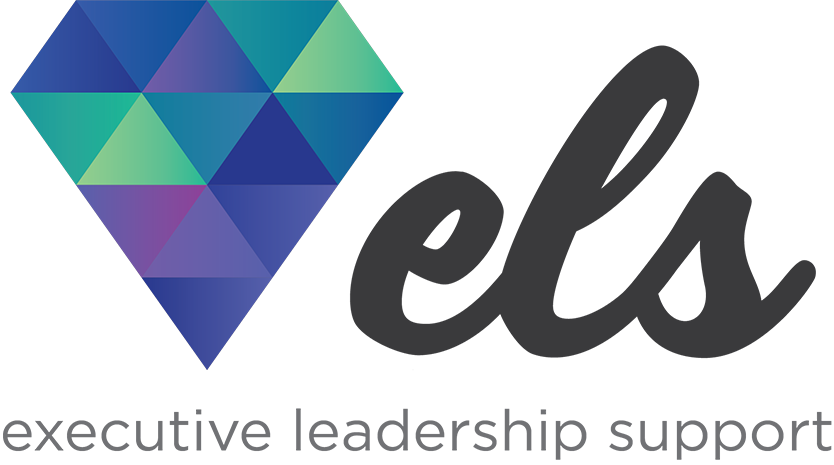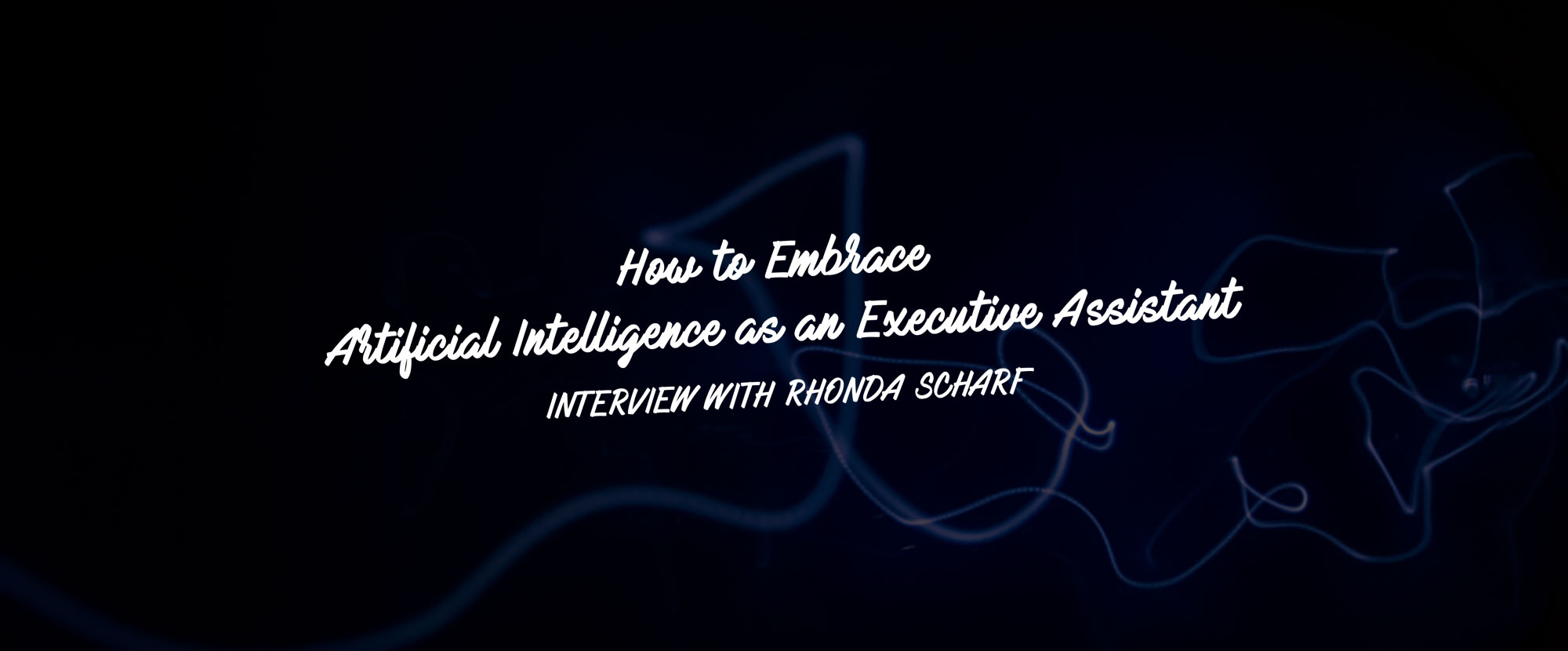How to Embrace Artificial Intelligence as an Executive Assistant
Interview with Rhonda Scharf
Artificial Intelligence (AI) is intelligence demonstrated by machines that gain knowledge from experiences, similar to how the human brain functions. Machines that can mimic cognitive functions such as thinking, problem-solving, and learning are considered to have artificial intelligence. Day-to-day, we see artificial intelligence most prominently in the form of Alexa or Google Home. As AI advances, executive assistants, in particular, may feel threatened as AI can mimic many EA job functions such as assisting with scheduling travel or organizing meetings. Ultimately, there is a lot of controversy whether AI will replace EAs altogether. We’re here to assure you that’s not the case.
While change doesn’t happen overnight, autonomous systems are evolving at a rapid pace. As we see from history, individuals who embrace fundamental changes in technological resources are the first to benefit. Tools like voice recognition, automated scheduling, and machine learning are just a few of the applications artificial intelligence brings to the table.
Rhonda Scharf, Speaker, Consultant, and Author, will soon be publishing a book outlining artificial intelligence and its effect on the workplace. Through an interview, she expands on the implications of AI on the executive assistant career and, more specifically, how to embrace it.
Can you explain Artificial Intelligence versus Human Intelligence?
Artificial Intelligence is thought processing done by a computer, learning from experience in the very way that human intelligence does. AI has the ability to make decisions instantly, utilize speech recognition, and even language translation. Two examples we already see in our daily lives would be Alexa and Google Home. As an example of how AI works, think of how we learn. When you’re three years old, you don’t know that stove is hot, so you reach out and touch it. When you’re 30 years old, you’ve learned through experience that the stove is hot and therefore you don’t touch it. Artificial intelligence does the same thing. For example, an online pizza chatbot might ask you what kind of topping you want on your pizza. After receiving intel that over 30 people have requested for pepperoni on their pizza, it might reword its question to ask if you would specifically like pepperoni on your pizza. The chatbot (which is an example of AI) learns to ask that question through experience and recognizing trends.
Computers learn from experience far faster than humans ever can. At the moment AI doesn’t have emotion, intuition or personality (although they are working on that). Overall, it’s a more black and white thinking process which is an advantage for today’s EA. There have been times where the black and white thinking of AI is not at all what an organization wants, and they need a live person to fill that gap. Empathy and compassion are important.
How can EAs utilize AI to their advantage?
EAs need to embrace the AI technology instead of resisting it. If an app exists that will make your life easier, embrace it and run with it! EAs can be very protective of their “turf,” which comes from a place of fear. The fear of the unknown causes people to be afraid that the technology will replace them. Even back in the 80s when computers were introduced to the workplace many feared they wouldn’t be needed. And while the stereotypical role of a “secretary” has been replaced, the EA role offers much more to the company. AI will not replace the EA. It may change the role (offering you new opportunities). I am jumping in and embracing as much AI as I possibly can. It frees up my time to take on the larger tasks. For instance, travel booking can be handed over to AI so that I can do things that I not only enjoy more, that are a better use of my time and abilities. There’s so much that can be embraced to maximize your time and abilities.
How will stepping up as a business leader protect the EA career from AI?
By downloading the time-consuming (often lower value) tasks to AI, EAs will be in a position to offer their executives and organizations higher value. We won’t be task driven anymore, but instead quality driven. That means we are bringing intuition and strategic thinking forward to help make more significant decisions within our companies. We are adding value in a new way when we have the time cleared to be an integral role within the company. With the advancement of AI, we will have more time and more opportunities to take a seat at the table and provide our opinions.
Why is having a seat at the table so important? Because often the perspective of senior leadership doesn’t reflect the perspective of the rest of the company. By removing those time-consuming tasks for executive assistants, they can better serve as an internal strategic business partner, helping to bridge some of those gaps within the company. EAs have the unique opportunity to straddle the high-level strategic approaches to the organization, but also the mid-level employee perspective. We can take a seat at the table and explain how decisions truly impact the company as a whole. AI is freeing up our time to allow us these opportunities. Executives generally learn that the higher they are in the organization, the less they feel connected with everyone. EAs have the unique opportunity to connect and relate at all levels. They are truly the bridge that connects multiple areas of an organization.
How can EAs keep up with current AI trends in the industry?
Go to conferences. Attend webinars. Read articles. Follower influencers online. Subscribe to newsletters.
First and foremost, follow the news, because it expands on a lot of AI trends. Furthermore, follow thought leaders in the EA space. Industry leaders who will shed light on how AI is affecting your industry and your career are particularly important to follow. You have to go looking for this information. Let the thought leaders do the research, and then follow what they have to say. Like EAs at the boardroom table, these thought leaders bring their experience and perspective to you.
How can an EA build their brand in the digital era?
EAs have to distinguish themselves from their competition in the same way an organization would. As an EA, you don’t just help the organization run smoothly. You’re Sarah, for example, and you are humorous and have intuition. You add personality to your decisions. You write very personalized emails and help bridge gaps with your company’s leadership team and the rest of the employees. Everyone has to have a specialty. That can be organizational skills or perhaps project management experience. It can be something entirely different, but you have to possess skills that set you apart.
If you’re going to pick a specialty, pick one that it doesn’t look like AI is going to bleed into that space anytime soon. Overall, choose a specialty that is going to make you stand out on a resume, in an office, or through reputation.
Can you tell me a little bit about the book you are coming out with?
The working title of my book is “Alexa is Stealing Your Job.” It isn’t just focused on executive assistants, but everyone as a whole and how we should be reacting to artificial intelligence in the workplace. It will further outline the steps we can take to protect our jobs so we aren’t outsourced by a computer, showing how we can add even more value to our organizations.
There is currently a lot of negative publications circulating regarding AI and the EA career. This book takes a positive spin on it and helps EAs protect the value they are bringing to their organizations.
Any last recommendations for EAs in regards to Artificial Intelligence?
I would recommend getting comfortable with either Alexa or Google Home in your home space. Make your house a smart house. Hook up your TV, doors, thermostat, and security cameras to your smart device. Start getting comfortable with Alexa or Google Home in your personal life and then start bringing some of those skills into the office and introducing it to your executive’s professional life. As simple as ordering office supplies through your device will gain your confidence, skills, and trust.
Rhonda Scharf is a well-recognized Professional Speaker, Trainer, Consultant, and Author based both in Ottawa Canada and Fort Myers Florida. Since 1993 she has worked with tens of thousands of people dozens of countries.
She has earned the highest speaking designation in the world, the “Certified Speaking Professional” (CSP) and was honored by being inducted into the Speaking Hall of Fame. Since 1998, Rhonda has been listed in “Who’s Who in Professional Speakers.”
Rhonda is one of the distinguished instructors at the ELS Forums. To join the conversation, check out the ELS Forum 2019 schedule, here.



